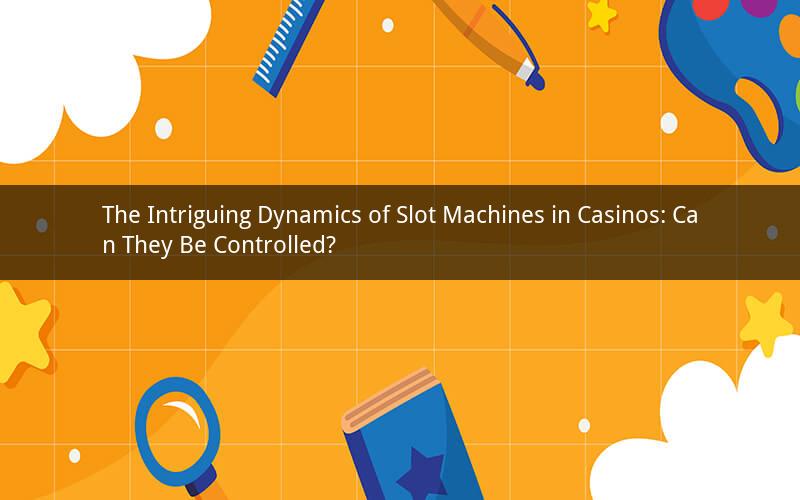
Introduction:
Slot machines have become a staple in the world of casinos, captivating players with their allure and potential for big payouts. However, the question of whether casinos can control these machines remains a topic of debate. In this article, we will explore the mechanisms behind slot machines and examine the extent to which casinos have the ability to control them.
1. Understanding Slot Machines:
Slot machines are complex devices that operate on a random number generator (RNG). The RNG ensures that each spin is independent and unpredictable, making the outcome of each game entirely random. This randomness is what makes slot machines so exciting and appealing to players.
2. The Role of Casino Operators:
Casino operators have a significant role in the functioning of slot machines. They are responsible for selecting the machines, setting the odds, and maintaining them. Here are some key aspects of their control over slot machines:
a. Selection of Machines:
Casino operators carefully select the slot machines that will be placed in their establishment. They consider factors such as popularity, payout percentages, and game themes. This selection process allows them to cater to the preferences of their target audience.
b. Setting the Odds:
While the outcome of each spin is random, casino operators have some control over the odds of winning. They can adjust the payout percentages of the machines to align with their business goals. For example, they may choose to have a few high-paying machines to attract players, while the majority of machines have lower payouts.
c. Maintenance and Calibration:
Regular maintenance and calibration of slot machines are crucial to ensure their proper functioning. Casino operators hire technicians to conduct these tasks, ensuring that the machines are operating correctly and within the prescribed parameters.
3. The Role of Government Regulations:
Government regulations play a significant role in the control of slot machines. Different countries have different laws and regulations governing the operation of casinos and their slot machines. Here are some key aspects of government control:
a. Licensing and Regulations:
Casino operators must obtain licenses to operate, and these licenses often come with strict regulations. These regulations may include requirements for machine payout percentages, fairness, and transparency.
b. Auditing and Inspections:
Government agencies conduct regular audits and inspections of casinos to ensure compliance with regulations. This includes verifying the accuracy of slot machine payout percentages and ensuring that the machines are fair.
4. The Challenge of Complete Control:
While casinos have a significant degree of control over slot machines, it is challenging to achieve complete control. The inherent randomness of the RNG makes it impossible to predict the outcome of each spin. Here are some factors that contribute to this challenge:
a. RNG Algorithms:
The algorithms used in RNGs are highly sophisticated and nearly impossible to crack. This makes it difficult for casino operators to manipulate the outcome of the machines.
b. Player Behavior:
The behavior of players can also impact the effectiveness of casino control. Players may engage in strategies or betting patterns that are not predictable, making it challenging to control the machines.
5. Conclusion:
In conclusion, casinos have a considerable degree of control over slot machines, including their selection, odds, and maintenance. However, the inherent randomness of the RNG and player behavior make it challenging to achieve complete control. Government regulations also play a crucial role in ensuring the fairness and transparency of slot machines. While casinos can exert control to some extent, the unpredictable nature of slot machines ensures that the excitement and allure of these machines will continue to captivate players for years to come.
Questions and Answers:
1. Can casinos completely control the outcome of each spin on a slot machine?
Answer: No, casinos cannot completely control the outcome of each spin. The random number generator (RNG) ensures that each spin is independent and unpredictable.
2. How do casinos determine the payout percentages of slot machines?
Answer: Casino operators can adjust the payout percentages of slot machines to align with their business goals. They have the flexibility to set these percentages within certain regulatory limits.
3. Do government regulations restrict the control casinos have over slot machines?
Answer: Yes, government regulations impose restrictions on the control casinos have over slot machines. These regulations ensure fairness, transparency, and compliance with prescribed payout percentages.
4. Can players manipulate the outcome of slot machines?
Answer: No, players cannot manipulate the outcome of slot machines. The RNG algorithms are highly sophisticated and nearly impossible to crack.
5. How do casinos select the slot machines they place in their establishment?
Answer: Casino operators carefully select slot machines based on factors such as popularity, payout percentages, and game themes. They aim to cater to the preferences of their target audience and create an engaging gaming experience.